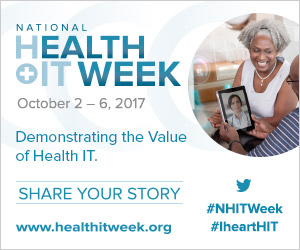
Today begins National Health IT Week, a nationwide awareness week focused on the value of health IT. EHRA is honored to be a National Health IT Week Partner, and proud of the contributions that EHRs make every day toward improved patient care in the U.S.
Recently, the advantages of EHRs were in the spotlight in the aftermath of Hurricane Harvey in Texas and Hurricane Irma in Florida. Headlines like “Electronic Health Records Rise Above Harvey’s Floodwaters” and “EHRs at Houston hospitals remain resilient against Hurricane Harvey” lead into stories about how EHRs contribute to effective continuing care in disasters.
From “Electronic Health Records Blunt Hurricane Harvey’s Impact” by James Swann at Bloomberg BNA:
The widespread adoption of EHRs has been especially important during Hurricane Harvey as many hospitals have been forced to evacuate patients to different providers… With EHRs, providers treating new patients can have instant access to patient information such as allergies, active medications, and diagnostic imagery.
Hurricane Katrina hit New Orleans in 2005, and the extensive loss of paper healthcare records ultimately fueled support for the creation and passage of the HITECH Act in 2009. In “Health IT passes first big test with Hurricane Harvey,” Politico’s Darius Tahir reminds us that:
Before Katrina, the costs of EHRs seemed prohibitive, former Surgeon General Regina Benjamin wrote in a 2010 New England Journal of Medicine article. After the storm, she changed her mind. “Whereas I had previously decided against installing an EHR system because I couldn’t afford one, I now realized I couldn’t afford not to have one,” she wrote.
We’ve all heard stories about challenges of EHRs, and there’s no question that we need to continue to improve, but it’s also important to recognize the progress being made. The positive effects of EHRs are not just apparent during catastrophic events like hurricanes, but every day, by healthcare providers and patients across the country.
Recently, the EHRA Standards and Interoperability Workgroup set out to collect information on the impacts of EHR interoperability, both in terms of quantity (e.g., transaction volumes) and quality (e.g., impacts on patient care, staff satisfaction). The resulting report, Interoperability Success Stories: the Journey Continues, is a collection of real-world examples showing the quality, cost, and care coordination improvements achieved by EHRA members’ customers in their work to share patient data within and across healthcare organizations, in the U.S. and beyond.
Also this year, EHRA hosted a Usability Summit, where participants created “personas” based on a variety of EHR users, including a Medical Assistant, a Primary Care Physician, a Hospital IT Technician and a Chronically Ill Patient. The event kicked off an effort by EHRA to create a publicly-available repository of personas to help EHR developers better understand the diverse range of people who rely on EHRs, in order to consider how they use and what they need from health IT. We’ll share more information on the Personas Project in the months to come.
Another recent resource created by EHRA is EHR Design Patterns for Patient Safety, which highlights many of the ways that consistency across health IT platforms can aid clinicians with tasks like accurately interpreting test results or prescribing the right medication at the right dose.
New National Coordinator for Health IT, Dr. Don Rucker, shifted ONC’s focus from adoption to usability and interoperability, which aligns well with existing industry efforts like those above. EHRA and its more than 30 member companies look forward to continuing to contribute to enhanced user experiences and expanded data exchange capabilities.
We also intend to celebrate the successes along the way! During this National Health IT Week, we encourage everyone who uses and benefits from health information technology to do the same.
